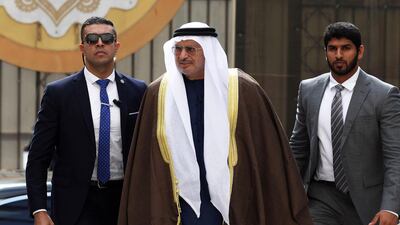It is "deeply concerning" that the Yemen crisis is not holding the attention of the global community despite an urgent need for a successful political process to aid the Yemeni people, Dr Anwar Gargash, the UAE Minister of State for Foreign Affairs, said on Sunday morning.
Later in the day, Saudi Arabia announced it had foiled an “imminent” attack from an explosive-laden boat in the southern Red Sea. The remotely operated boat originated from Houthi forces in Hodeidah, Saudi press agency SPA said.
“Houthi militias are using Hodeidah governorate to launch ballistic missiles, drones and are deploying sea mines, in a clear and explicit violation of international humanitarian law, the Stockholm Agreement and Hodeidah’s ceasefire,” Saudi coalition spokesman Col Turki Al Malki said.
The UN brokered a historic deal between Yemen’s internationally recognised government and the Houthis in Sweden in December 2018.
It included a ceasefire and for all troops to withdraw from the port city of Hodeidah.
The coalition also announced it had intercepted and destroyed three naval mines planted by the Houthis in Bab Al Mandeb and the southern Red Sea in the past 24 hours.
The latest attack brings the total number of naval mines planted by the rebels to 150, Col Al Malki said.
“We will continue to carry out strict measures against the Houthi terrorist militia and to destroy such capabilities that threaten regional and international security,” he said.
The rebels' actions shows their “unwillingness” to end the war in Yemen, Col Al Malki said.
Last weekend, as Saudi Arabia hosted global financial leaders before this year’s G20 summit in Riyadh, the government announced it had intercepted ballistic missiles that were launched from Yemen’s capital Sanaa.
The missiles were fired “in a systematic, deliberate manner to target cities and civilians”, Col Al Malki told the state news agency.
Saudi Arabia is commonly the target of long-range ballistic missiles and drone attacks by the Houthi rebels, but recently the weapons are becoming increasingly sophisticated.
A recent report by UK-based think tank Conflict Armament Research detailed how the Iranian-made weapons are bolstering the Houthis' capacity.
Meanwhile, the Iran-backed Houthi rebels have blocked half of the UN's aid delivery programmes in the war-torn country to force the agency to give them greater control over the humanitarian campaign.
They were also seeking a portion of the billions of dollars in foreign assistance flowing through the country, according to aid officials and documents obtained by AP.
The Houthis’ action has hindered several programmes that feed the near-starving Yemeni population and help those displaced by the nearly six-year civil war, a senior UN official said.
The UN children's fund has referred to life in Yemen as "a living hell" for children, with 30,000 young people dying of malnutrition annually.
Damage to hospitals and schools as a result of the war means children have unreliable access to education or health services.
There are more than 4.7 million children in Yemen requiring educational assistance.
“We were hopeful that peace would be on the horizon in Yemen, but the worrying escalation of violence over the past few weeks is a harsh reminder that children in Yemen continue to carry the heaviest burden of the conflict,” said Sara Beysolow Nyanti, Unicef’s representative in Yemen.
The country is the largest humanitarian crisis in the world, according to Unicef, with more than 80 per cent of the population, including 12 million children, requiring humanitarian assistance.
Last week, 19 children were among 31 people killed in air strikes in Yemen's rebel-held northern territory of Al Jawf, the UN reported.

